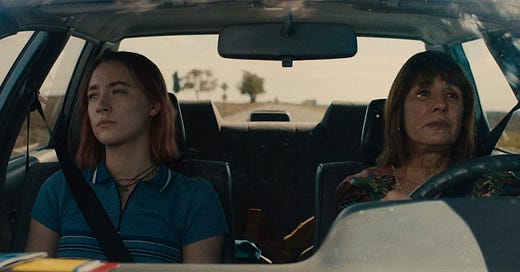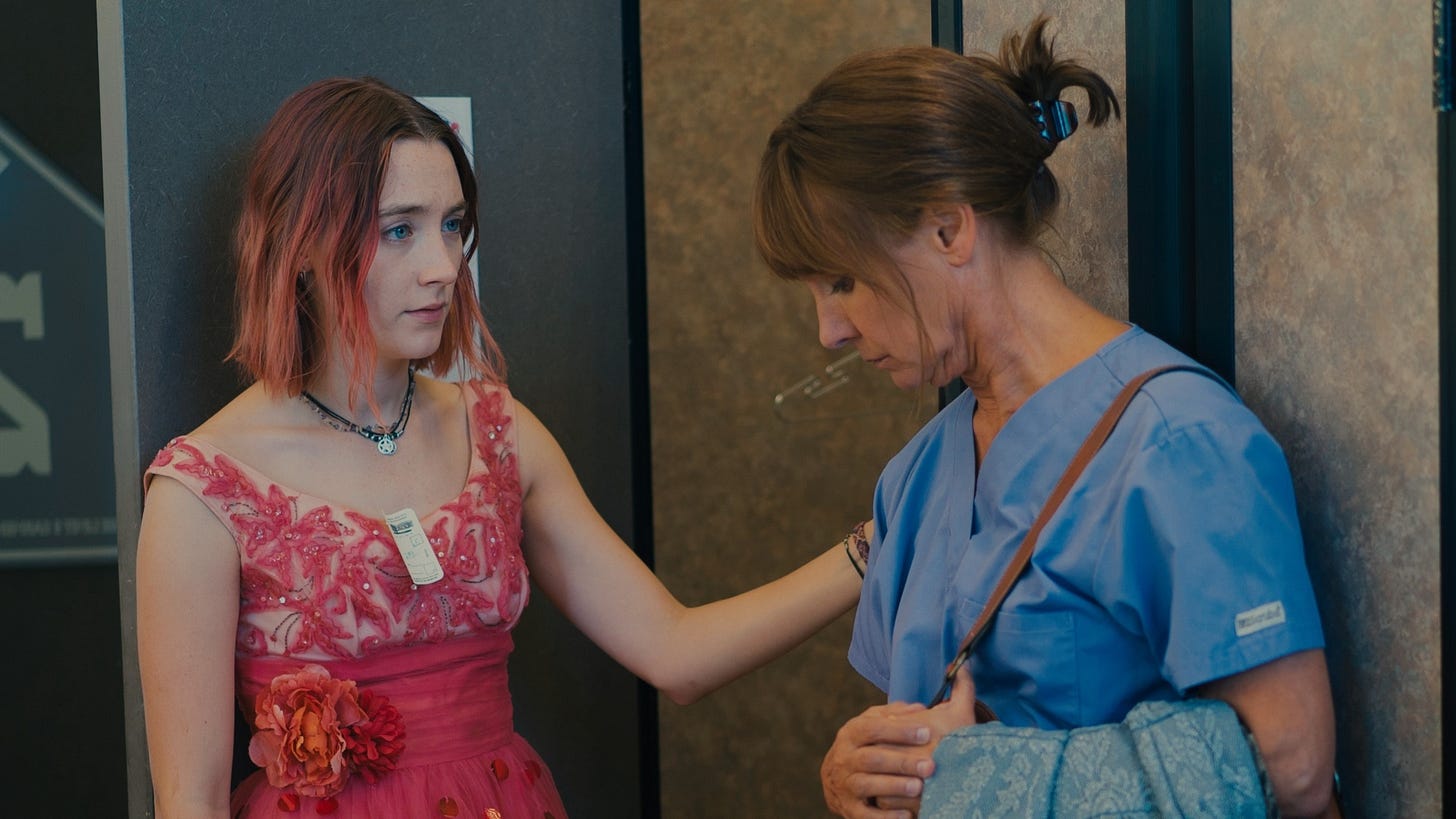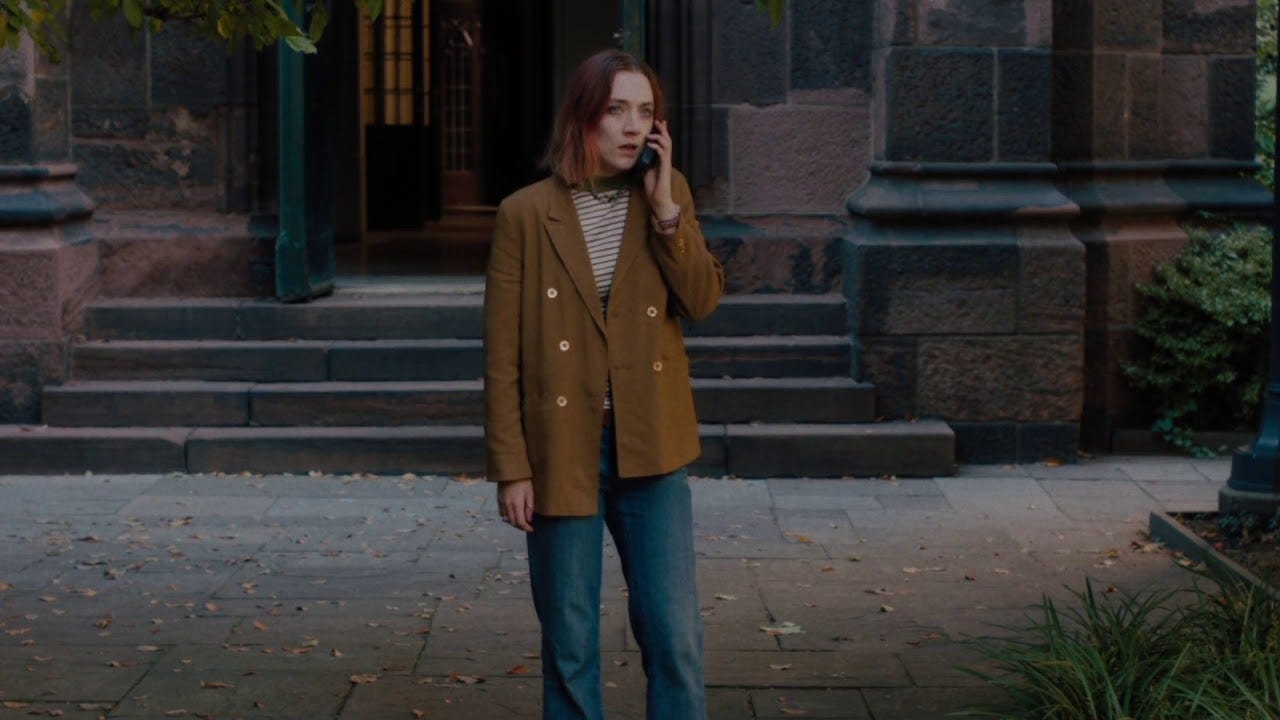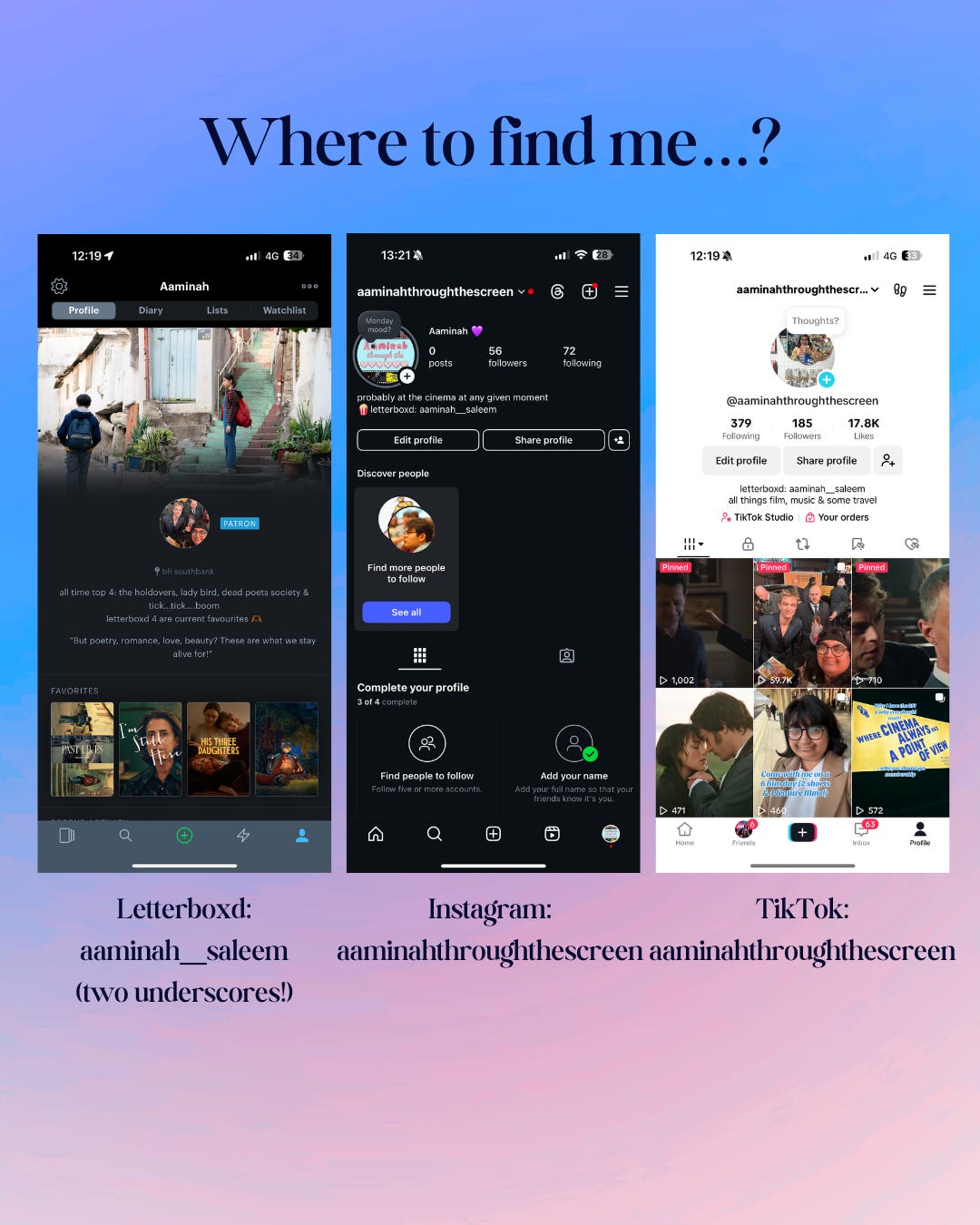The opening scene of Lady Bird is deceptively tender, we begin with Lady Bird and her mother (Marion) lying in bed. At peace. They begin to checkout of their room and then leave their hotel. Lady Bird and Marion are then in a car finishing the Grapes of Wrath audiobook and begin to cry together with a shared vulnerability as they finish it. Lady Bird remarks on how long their college trip took and it feels as if this film is a coming-of-age story solely about Lady Bird’s senior year and finding herself. But then Lady Bird turns on the radio, and the illusion of this rosy mother-daughter relationship is shattered. This casual conversation spirals and becomes a tense exchange, and we are introduced to this volatile dynamic.
As the argument unfolds, Gerwig’s writing and direction makes it clear that these are two women who are fundamentally out of sync. Both Lady Bird and Marion do not know how to communicate the love they feel to the other in a language they understand. Lady Bird is young and keen for something more than living in Sacramento and wants her life to be full of these grand and meaningful experiences, and she is a romantic. In contrast, Marion is practical, she believes criticism and challenging Lady Bird are ways to toughen her up for when she has to face the real world.
Lady Bird and Marion remind me a lot of my Mum and I. I was never a particularly ‘bad’ or ‘naughty’ child, but I grew up from a sweet and quiet girl who wouldn’t say boo to a ghost and became a teenager who could be prone to fits of sullen moods which manifested in picking arguments and being perpetually frustrated. One notable scene that I keep coming back to is the prom dress buying scene. Lady Bird is anxious to find a perfect dress which marks one of her last moments of being a teenager before she sets off for college and goes shopping with her mother.
As we see her try on dresses, we observe that turbulent dynamic coming into play. As she tries on a dress which is not flattering and exclaims it is far too tight, her mother makes reference to a second plate of pasta she ate earlier under the guise of being helpful. In that moment, Lady Bird is frustrated and vulnerable, and wants love and support and for her mother to reassure her she will find the perfect dress or simply as Lady Bird remarks, “Why can't you say I look nice?”. Mothers often get love and criticism mixed up, love is perceived as brutal honesty as Marion believes it is truly a piece of practical advice, or her doing Lady Bird a favour.
There are often times I think back to where I chose something which in retrospect was hideous or unflattering, but in the moments where I wanted the opinion of anyone, I wanted either the validation it looked nice or that it was unsuitable. Receiving comments intending to be helpful centred about my body changed the way I fundamentally felt about how I looked, and how I was being perceived by others. And in that small clip, you can see Lady Bird’s frustration with her mother who is unable and unwilling to provide her with what she needs in that moment where she is vulnerable.
Rewatching this film as a 24-year-old is cathartic, because I can now understand that there is not a villain or a hero to the story. It would do a disservice to the film and its representation of a mother-daughter dynamic to portray it like that. But sixteen-year-old me who was dreaming of living different lifetimes and living in these places I saw through film and TV could not comprehend that fully. On my first watch, I spent the whole film wanting to shake Marion and scream at her. But now? I also want to shake Lady Bird at several moments.
Gerwig is able to portray this relationship, not as a binary of right and wrong, but as an emotionally complex bond between two flawed people who love each other deeply. Marion is the polar opposite of Lady Bird through her practical worldview, but she has to be. Her husband has lost his job and she needs to pull double shifts as a nurse and is shouldering the pressure of being the sole breadwinner. The weight of her responsibilities hardens her and she clearly wants for more, for her and her family. On the other hand, I’m sure someone has seen the film and may perceive Lady Bird as a selfish teenager chasing dreams and an education her family cannot afford. But as the film progresses, you can’t. As Marion finds out about these applications which were submitted behind her back, she is furious. And as for Lady Bird, we see her as a young girl who is soon leaving her family and friends and all she is known behind tearfully begging her mother for forgiveness. She is clearly full of remorse and Marion refuses to acknowledge her.
It is important to acknowledge the fact that Marion is the mother, she is the adult. She has the life experience, responsibility and authority. In contrast, Lady Bird’s mistakes can be partially attributed to her youth and her limited life experience. Gerwig offers us the viewer a small clue which helps us to understand Marion’s parenting. The only mention of Marion’s mother is a passing reference that she was an “abusive alcoholic.” In this small moment, we can see how Marion is trying to not be her mother and is trying to be better. This is not used as a justification however. It adds to the overall story, because it shows how generational trauma through how our parent’s parents treated them can lead to that pain being passed down. This pain may not be necessarily the same, but it is reshaped. Marion is not portrayed as an alcoholic like her mother was, but nevertheless, she is harsh and emotionally neglectful of Lady Bird. She is not her mother at all, but she has the capacity to pass down that harm.
As Lady Bird is about to leave for college and is ready to take a plane to New York, we see her reach out and repeatedly ask her mother if she is coming to see her off. Her mother is emotionally distant after weeks of ignoring her and unwilling to say goodbye. She drops her off and drives away, to then realise her mistake, and rushes back to say goodbye. But she is too late. There is no melodramatic soundtrack to accompany this moment, it is mostly silent. We sit with this unspoken love and goodbye. We want Marion to make it back in time and say goodbye, for this to be a reunion. But life does not always work out like that. This fractured relationship will not and cannot be resolved by a goodbye at the airport. The mending of their relationship will require much more. The slow and long process of understanding each other and being able to express their love, in a way the other can recognise. This scene is quietly tragic, and the enormity of Lady Bird’s departure is realised.
As Lady Bird unpacks, we see her discover crumpled letters Marion had wrote to her, which her father saved and snuck into her suitcase. Throughout the duration of the film, we see some beautiful moments between the two, but at many points the relationship is adversarial and Marion is seen as tough and practical. Yet here, these letters provide us and Lady Bird with an idea of Marion’s tenderness and vulnerability - not wanting her daughter to discover these letters in fear that she would be judged for the way she expresses herself. The act of Marion picking up a pen to put to words what she cannot bring herself to say reflects on the woman we observe throughout the film, she cannot express affection and love like Lady Bird. It feels as if the discovery of these letters is the first step to resolving the tensions between the both of them.
And we come to the end of the film. Christine (no longer calling herself Lady Bird) is alone in New York after the chaos of moving in, going to parties and drinking to the point of being taken to hospital. With this quiet and her choice to step into a local church, she has time for contemplation and proceeds to leave a voicemail for her mother. Her choice to embrace her given name, Christine, is not a rejection of the name Lady Bird. It is a recognition of where she came from. At the beginning of the film, she sees Sacramento as a small place that is suffocating. This scene and an earlier discussion with a nun who observes “you clearly love Sacramento”, we see Christine’s love and appreciation of Sacramento. She observes the city, the bend of the roads, the people and parts of her everyday life. It is an appreciation for a place that is home. Leaving home does not give her this clarity. But it is the distance and the emotional maturity she has gained that allows her to pick up the phone and leave a voicemail. This phone call is a bridge.
This was a really difficult post for me to write, because Lady Bird is one of my favourite films of all time and I see myself so much in her. It was one of the films which I felt gave me the opportunity to see past myself, emphasise more with my mother and introduced me to Saoirse Ronan, whose career I have keenly followed since. I recently bought myself the screenplay book as a gift to me, but also an acknowledgment of how much this film means to me and I look through the script and read the essays within the book.
As part of my endeavour to write about film and also create content about film, I wanted to also include other accounts I have where I produce edits of TV shows, films and also day in the life content of my cinema trips and life through film. My handles are all aaminahthroughthescreen across Substack, Instagram and TikTok, and aaminah__saleem on Letterboxd.
Thank you for my friends and to those of you who are strangers to me, who support this Substack. I began writing in order to force myself out of the perpetual discussion of wanting to write with my friends, realising my fears and anxieties would always try and prevent me from putting myself out here.









i love this! i love the film and i love how you're analysing this!
Love this film so much and anything Greta Gerwig touches!!